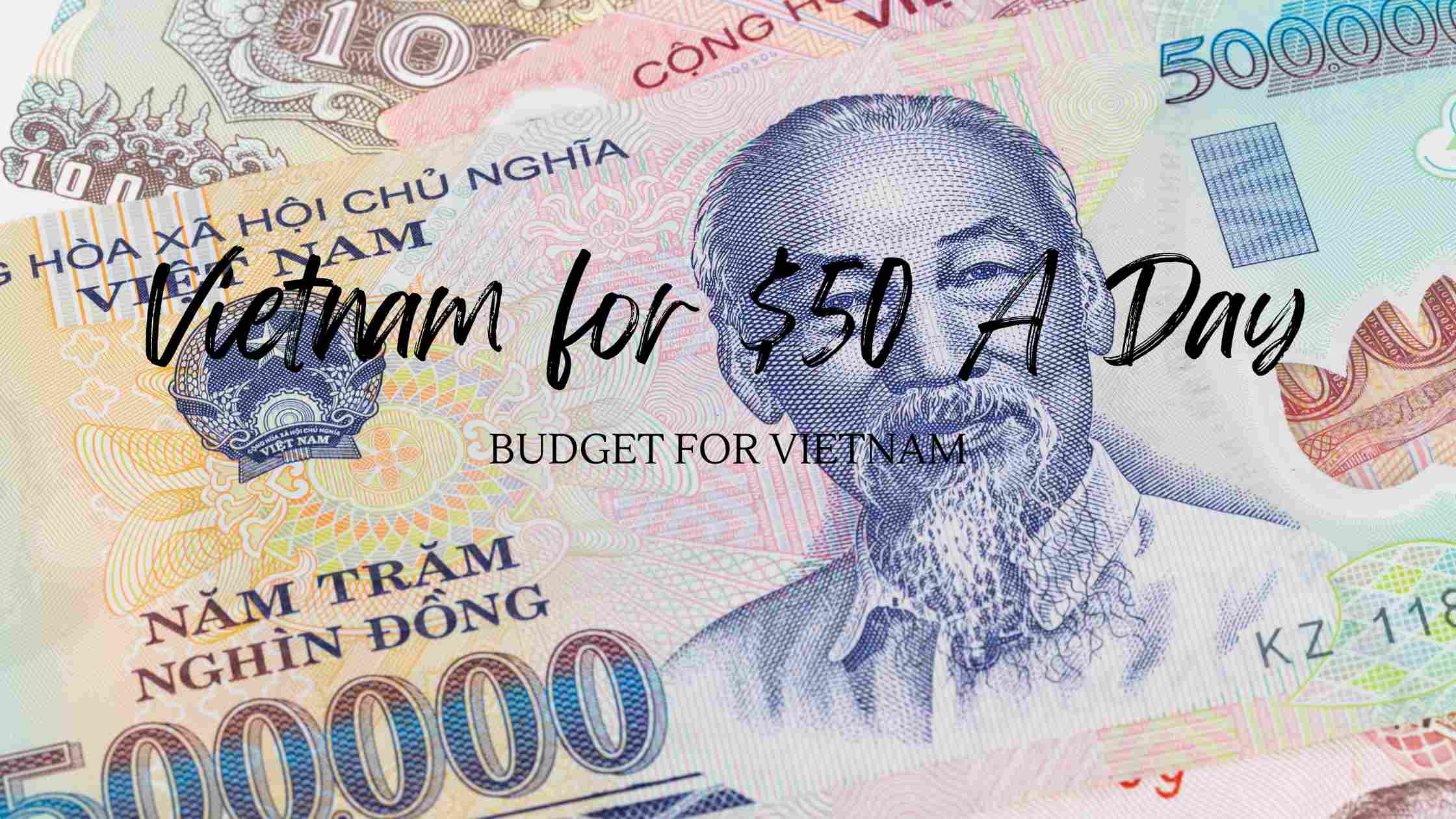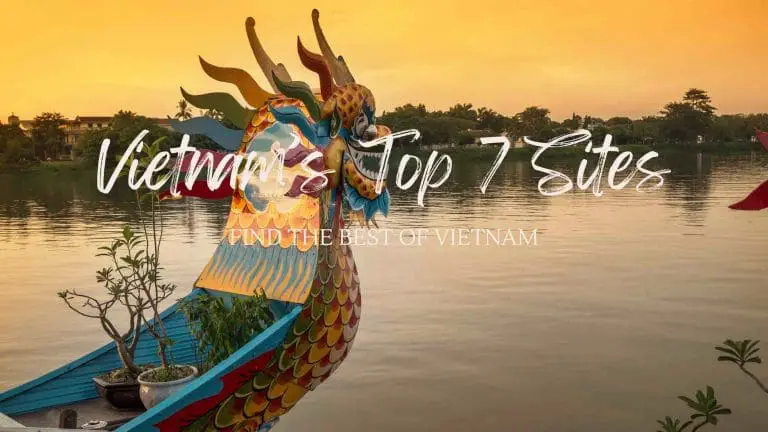Budget For Vietnam on $50 a Day: The ultimate In-Depth Guide
Planning a trip to Vietnam can be an exciting adventure, but it’s important to consider your budget for Vietnam. From the bustling streets of Hanoi to the serene beaches of Nha Trang, Vietnam offers a rich tapestry of experiences. The average costs of accommodation in Vietnam, activities in Vietnam, and transportation within Vietnam play a significant role in your overall budget. Public transportation is a cost-effective way to explore the cities, while a 5-star experience awaits those with a higher budget for Vietnam.
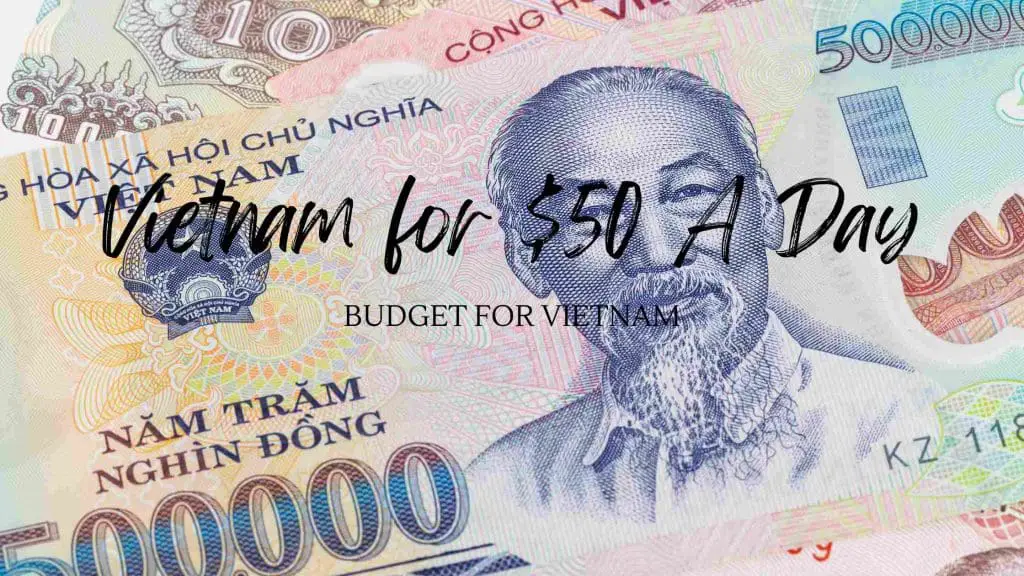
When calculating your budget for Vietnam, accommodation costs vary widely, from budget hostels to luxurious hotels. Activities in Vietnam can range from free walking tours to pricier adventure sports. Transportation in Vietnam is relatively inexpensive, with various options to suit all budgets. Understanding these costs is crucial for a well-planned budget for Vietnam.
Food lovers will be delighted to know that Vietnam is a haven for delicious and affordable meals. Street food is not only a budget-friendly option but also a way to immerse yourself in the local culture. However, dining in western restaurants will have a higher impact on your budget for Vietnam. Always include a little extra in your budget for Vietnam for those unexpected food adventures.
A well-planned budget for Vietnam ensures a stress-free trip, allowing you to enjoy the beauty and diversity of the country without financial worries. Whether you’re a backpacker or a luxury traveler, understanding the average costs, from accommodation to activities, will help you make the most of your budget for Vietnam.
Budget for Vietnam: Planning Your Trip
Before embarking on your Vietnam travel, there are several pre-trip considerations to factor into your budget for Vietnam. Flights to Vietnam can vary greatly in price depending on the season, so it’s wise to book in advance. Additionally, securing travel insurance is a crucial step for any unforeseen circumstances during your trip. This not only protects your budget for Vietnam but also ensures peace of mind.
Researching and planning are key to a successful Vietnam trip. This includes understanding visa requirements, estimating daily expenses, and considering the types of activities you wish to do. A well-thought-out plan will help you allocate your budget for Vietnam effectively, ensuring a smooth and enjoyable experience.
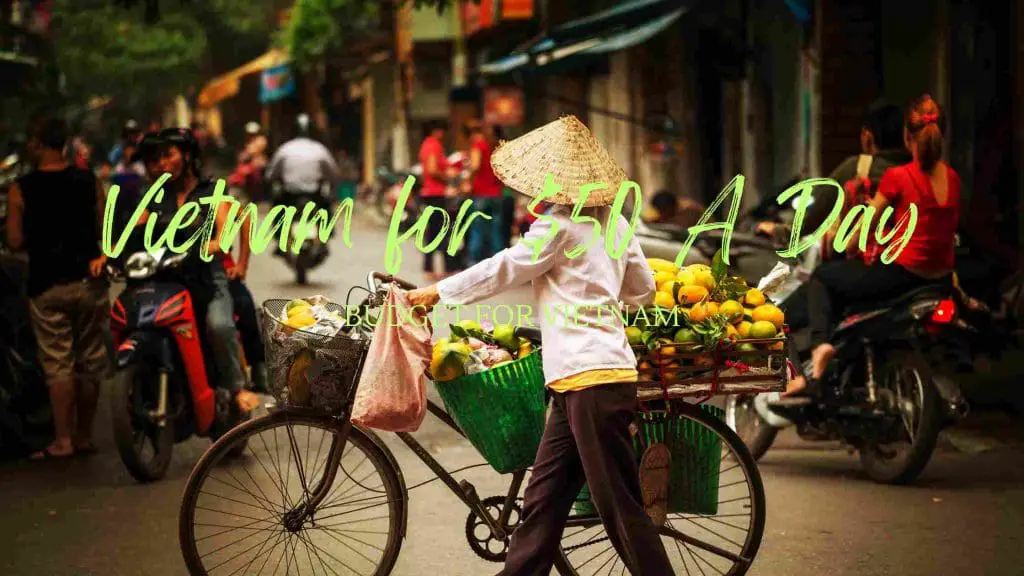
Vietnam Pre-Trip Costs
Before setting foot in Vietnam, there are several pre-trip costs to consider. The visa on arrival is a convenient option for many travelers, but it does come with its own set of fees. Additionally, accommodation costs and food prices are crucial elements to factor into your budget for Vietnam. Understanding these expenses beforehand will help you manage your finances better.
Transportation costs to and within Vietnam can also impact your overall budget. Whether it’s the cost of flights to Vietnam or the anticipated expenses of travel in Vietnam, being prepared is key. A comprehensive overview of these costs will provide a clearer picture of your Vietnam trip expenses, allowing for a more accurate budget for Vietnam.
Visa Requirements and Fees
For many travelers, a visa is necessary for entering Vietnam. One popular choice is the visa on arrival, which can be convenient but requires a letter of approval beforehand. This process involves a fee, which should be included in your budget for Vietnam. Additionally, some travelers may opt for a tour from Hanoi to Phong Nha, which also requires budget consideration.
The cost of the visa and any associated fees, such as those for expedited processing or additional pages, should not be overlooked. These fees can vary, so it’s important to research the latest information when planning your budget for Vietnam. Including these costs upfront can prevent surprises and ensure a smoother entry into the country.
It’s also worth noting that visa requirements can change, so keeping up-to-date with the latest information is crucial. Whether planning a short visit or an extended stay, understanding the visa process is a key step in budgeting for your trip to Vietnam.
Travel Insurance Considerations
When traveling to Vietnam, securing travel insurance should be a top priority. Unforeseen events such as illness, theft, or travel disruptions can impact your trip and budget for Vietnam. Travel insurance provides a safety net, ensuring that unexpected costs do not derail your plans. This is an essential aspect of your pre-trip planning and budget for Vietnam.
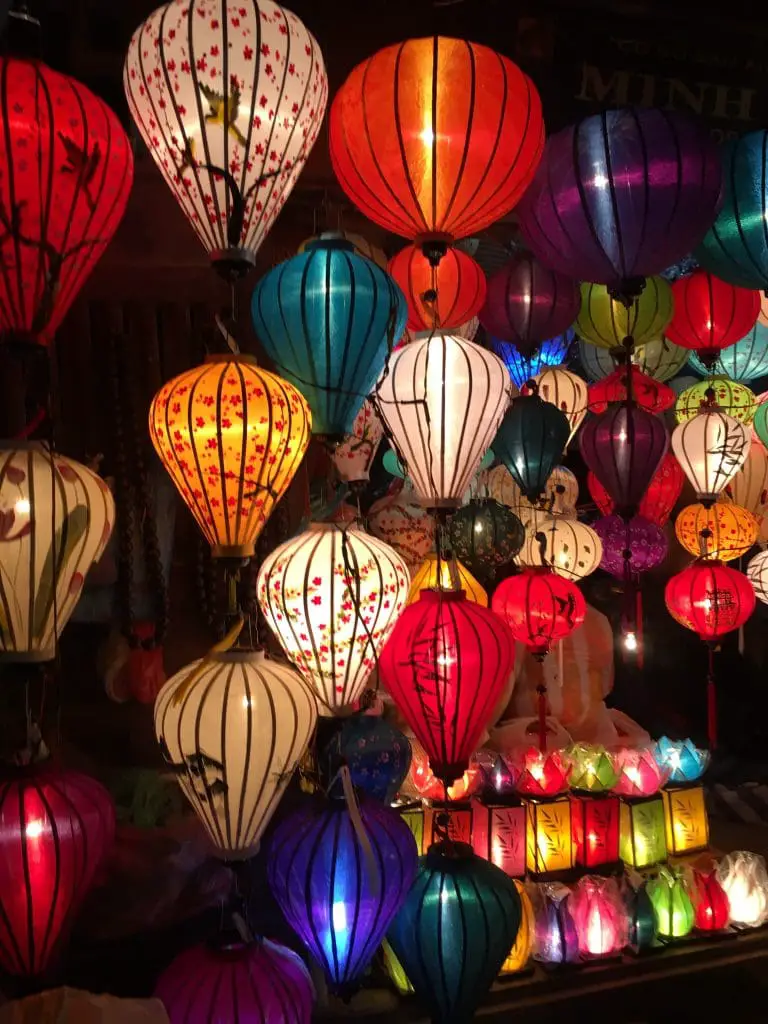
There are various travel insurance options available, each offering different levels of coverage. When selecting a policy, consider the activities you plan to do in Vietnam. For instance, if your Vietnam travel includes adventure sports, ensure your policy covers these activities. Allocating a portion of your budget for Vietnam to a comprehensive travel insurance policy is a wise investment.
Ultimately, the cost of travel insurance is a small price to pay for the peace of mind it provides. It safeguards your budget for Vietnam by protecting against significant unexpected expenses. Always read the fine print and understand what your policy covers to make the most informed decision for your trip.
Budgeting for Your Trip
Creating a budget for your Vietnam trip is crucial for managing your finances and ensuring a stress-free experience. Start by listing all potential expenses, including pre-trip costs, accommodation, transportation, food, activities, and a contingency fund. This comprehensive approach will help you develop a realistic budget for Vietnam.
Remember, flexibility is key when budgeting for your Vietnam trip. Prices can vary based on location, season, and personal preferences. Having a flexible budget for Vietnam allows you to adapt to any changes and make the most of your travel experience. Planning ahead and being informed will enable you to enjoy all that Vietnam has to offer, within your budget.
Suggested Daily Budgets for Vietnam
Traveling in Vietnam can be incredibly rewarding, with its rich culture, stunning landscapes, and friendly locals. However, managing your budget for Vietnam is essential to enjoy this experience fully. For budget travelers, a daily budget of around $20-30 can cover basic accommodation, street food, public transportation, and some activities. Mid-range travelers might consider a budget of $50-100 per day, allowing for more comfortable accommodation, restaurant meals, and additional activities.
Luxury travelers, on the other hand, can expect to spend over $150 per day, enjoying 5-star accommodations, fine dining, and exclusive experiences. Regardless of your travel style, there are plenty of options to tailor your budget for Vietnam to your needs and preferences. Including a mix of activities, from free walking tours to paid excursions, can enhance your experience while keeping costs manageable.
Ultimately, your daily budget for Vietnam will depend on your travel style, priorities, and flexibility. By planning ahead and making informed choices, you can ensure a memorable and affordable trip to this beautiful country.
Budget for Vietnam Accommodation Costs

Accommodation costs in Vietnam can vary widely, affecting your overall budget for Vietnam. For budget travelers, hostels and budget hotels offer affordable options, especially in tourist areas like the Hanoi Old Quarter or near the bus station in major cities. Prices for a basic room in Vietnam can start as low as $5-$10 per night, with options available across the country.
For those seeking more comfort, mid-range and luxury accommodation options abound. Hotel rooms with more amenities, such as a rooftop pool or an on-site restaurant, typically range from $20-$50 per night. Luxury seekers can find 5-star hotels offering exquisite experiences, with prices starting at $100 per night, especially in prime locations like Nha Trang or near popular attractions. Always consider the location, amenities, and reviews when selecting your accommodation to ensure it meets your expectations and fits within your budget for Vietnam.
Budget Hotels and Hostel Prices
Finding a place to stay that fits a tight budget for Vietnam is easier than one might think. Hostels and budget hotels offer comfortable accommodations without breaking the bank. On average, one night in a hostel can cost as little as $5 to $10, providing basic amenities and a chance to meet fellow travelers.
Budget hotels, on the other hand, offer a bit more privacy and comfort, with prices ranging from $10 to $20 per night. These spots often include free Wi-Fi, air conditioning, and sometimes even breakfast. For those looking to extend their budget for Vietnam even further, opting for rooms with shared bathrooms can save a few extra dollars.
Staying in these budget-friendly options not only helps save money but also offers an authentic experience of Vietnam. Many are located in the heart of cities or close to popular attractions, making it easy to explore. With a little research, travelers can find the perfect spot to rest without straining their budget for Vietnam.
Cost of Luxury and Mid-range Hotels
In Da Nang and other tourist hotspots, hotel prices can vary widely, catering to all preferences and wallets. A luxury hotel might cost anywhere from $100 to over $300 per night, offering top-notch amenities, stunning views, and exceptional service. These high-end accommodations provide an unparalleled experience for those willing to stretch their budget for Vietnam a bit more.
Mid-range hotels strike a balance between comfort and cost, with prices typically ranging from $40 to $100 per night. These hotels often feature convenient locations, comfortable rooms, swimming pools, and sometimes free breakfast, making them a great value for travelers looking to enjoy a bit of comfort without the luxury price tag.
Da Nang, known for its beautiful beaches and vibrant nightlife, has a wide range of accommodation options. Whether opting for the lavishness of a luxury hotel or the solid value of a mid-range hotel, travelers can find the perfect place to stay that fits their budget for Vietnam and their style.
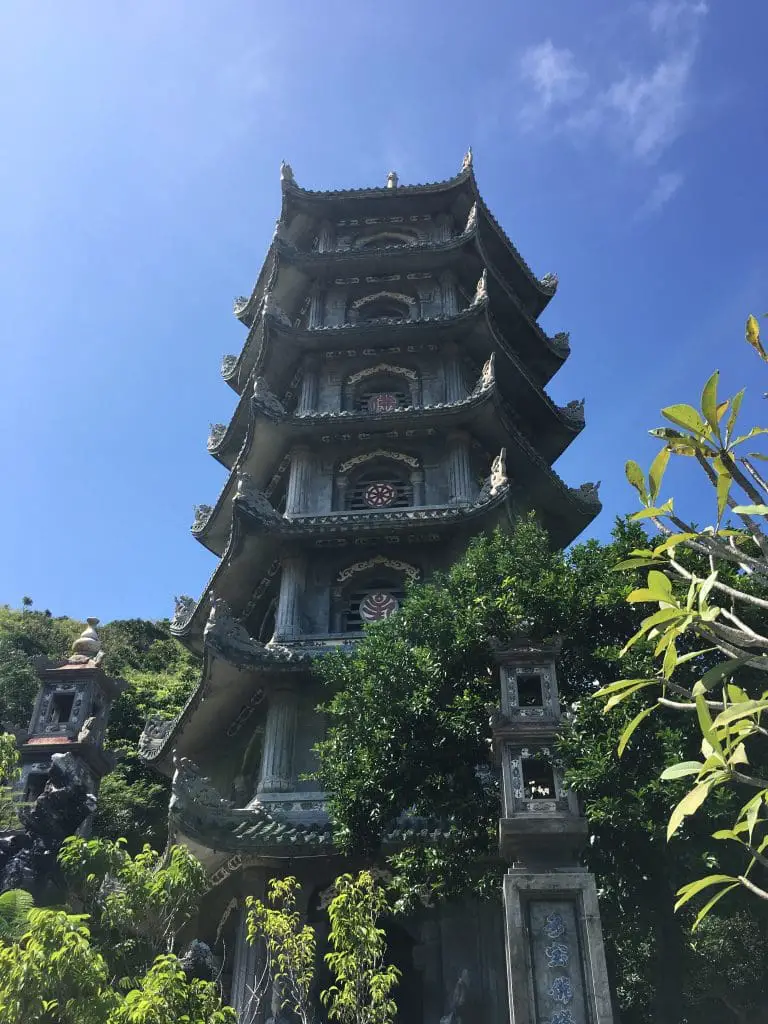
Saving on Accommodation
One of the best ways to stretch a budget for Vietnam is by being savvy about accommodation choices. Exploring different accommodation options can reveal hidden gems that offer great value for money. Staying in guesthouses, shared dormitories, or even homestays can significantly reduce lodging expenses.
Additionally, considering locations slightly off the beaten path can also lead to savings. Areas just a few blocks away from major tourist sites often have lower prices but still provide easy access to attractions. This approach not only saves money but also offers a more local experience, adding depth to the travel experience in Vietnam.
Booking in Advance vs. On-the-Spot
Planning ahead can make a big difference to a budget for Vietnam. Booking accommodation in advance often secures better rates, especially during peak travel seasons when prices can skyrocket. Many hotels and hostels offer early bird discounts, rewarding travelers who are organized and book early.
However, booking on-the-spot can sometimes lead to last-minute deals, particularly during the off-season or in less touristy areas. Some travelers prefer this method for its flexibility, allowing them to negotiate prices directly with accommodation providers. This approach requires a bit of risk-taking but can result in significant savings for those with a flexible itinerary.
In conclusion, both strategies have their merits, and the choice depends on one’s travel style and budget for Vietnam. While booking in advance offers peace of mind and potential savings, on-the-spot bookings can lead to unexpected deals, enriching the travel experience with spontaneity.
Avoiding High Season Price Hikes
Traveling during high season means facing not just crowds but also inflated prices, which can stretch a budget for Vietnam thin. To avoid these price hikes, consider visiting during shoulder seasons, the periods before and after peak tourist months. During these times, the weather is still pleasant, and prices are more reasonable.
Another strategy is to book accommodations and activities well in advance. Early bookings can lock in lower prices, protecting your budget for Vietnam from the steep increases that come with high demand. Many hotels and tour operators offer early bird discounts, making this an attractive option for budget-conscious travelers.
Lastly, being flexible with travel dates and destinations within Vietnam can also lead to savings. Some regions have different peak seasons, and by shifting your itinerary, you can enjoy lower prices and smaller crowds. This flexibility not only helps save money but also offers a more relaxed and personal experience of Vietnam’s beauty.
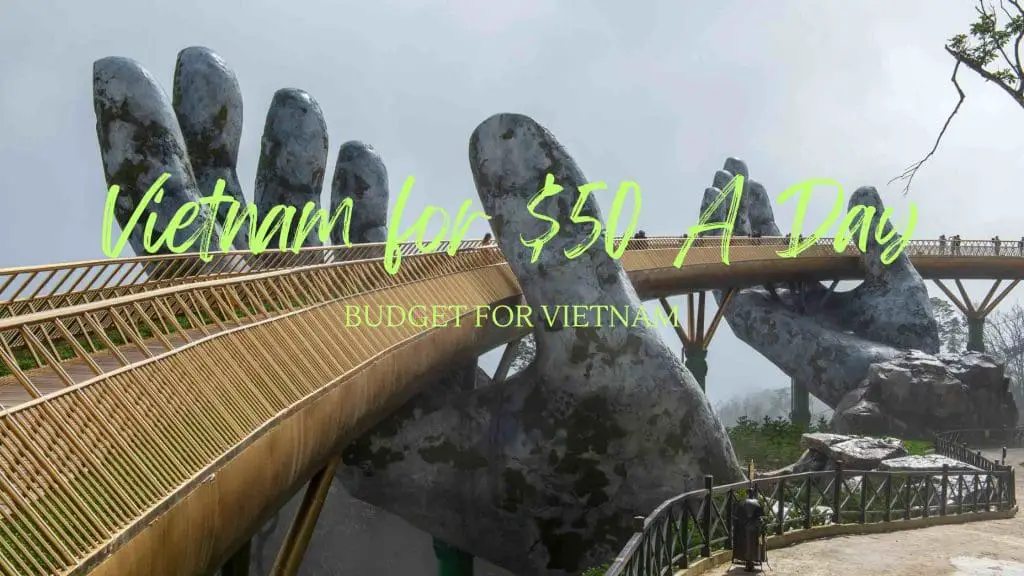
Budget for Vietnam Transportation: Getting Around
Transportation prices in Vietnam can vary, but with careful planning, they don’t have to strain your budget for Vietnam. From north to south, travelers have multiple options to navigate the country efficiently and economically. Whether it’s hopping on a local bus, renting a motorbike, or taking a domestic flight, there’s a transportation method to suit every budget and style.
Motorbike rental, in particular, offers a thrilling and flexible way to explore. It allows travelers to set their own pace and itinerary, often leading to less-visited locales and a deeper understanding of Vietnam. With careful consideration of transportation options, moving around Vietnam can be both an adventure and a cost-effective aspect of your trip.
Getting Around: An Overview
Travel in Vietnam is an adventure in itself, offering a variety of experiences from north to south. The country’s extensive network of buses, trains, and domestic flights connects major cities and tourist destinations, making it easy for travelers to plan their journey according to their budget for Vietnam.
For those keen to explore remote areas, like the stunning landscapes around Phong Nha, renting a motorbike might be the best option. It provides the freedom to venture off the beaten path at one’s own pace, offering a unique perspective of Vietnam’s rich culture and breathtaking scenery.
Cost of Public Buses and Trains
Public buses and trains are among the most cost-effective ways to travel across Vietnam. The average daily cost for using these modes of transportation can be surprisingly low, allowing travelers to stretch their budget for Vietnam further. Buses, in particular, offer extensive coverage, reaching even the most remote areas.
Trains, on the other hand, provide a scenic and comfortable way to travel long distances, especially for overnight journeys. Though slightly more expensive than buses, trains offer different classes of service, catering to a range of budgets and preferences.
By carefully selecting routes and booking tickets in advance, travelers can make the most of Vietnam’s public transportation system without significantly impacting their budget for Vietnam. This not only saves money but also offers a chance to experience the country’s diverse landscapes and communities up close.
Taxis, Moto Taxis, and Ferries Pricing
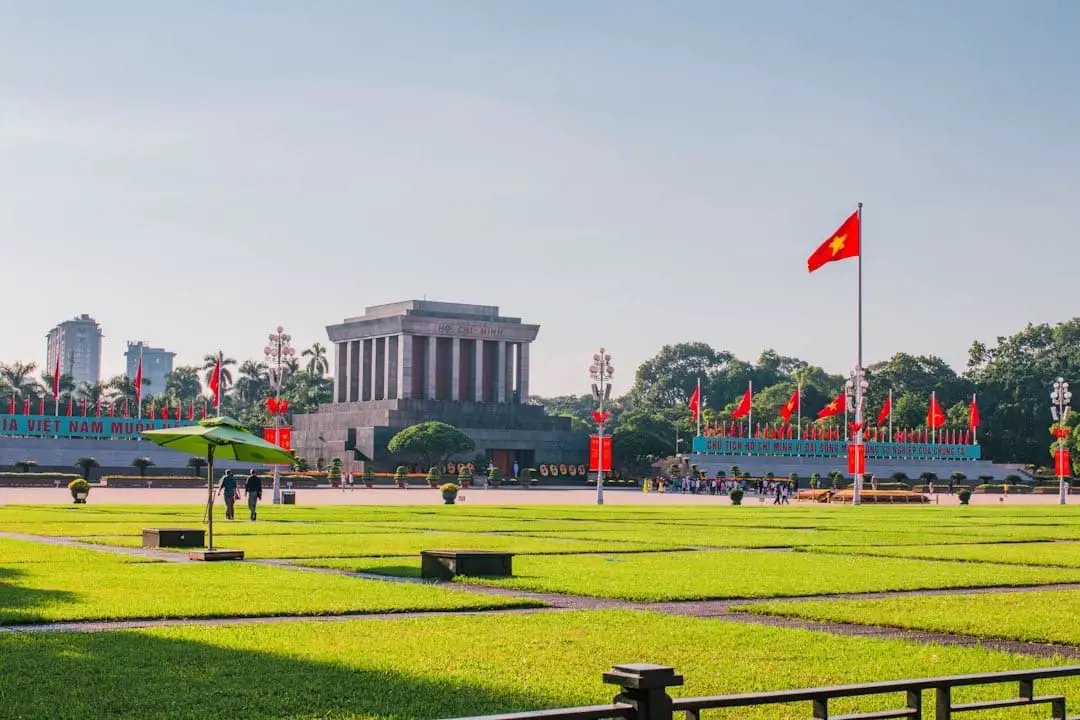
Taxis and moto taxis are convenient for short distances, offering door-to-door service at reasonable rates. While slightly pricier than public transportation, they provide flexibility and comfort, especially in bustling cities where navigating on foot or by bus can be challenging.
Moto taxis, in particular, are an affordable and thrilling way to zip through traffic, offering an authentic Vietnamese street-level experience. Negotiating the fare before the ride is key to getting a good deal and keeping travel expenses within your budget for Vietnam.
Ferries are essential for reaching Vietnam’s islands and remote coastal areas. Prices are generally low, making ferries a cost-effective option for travelers looking to explore beyond the mainland. By integrating these various modes of transportation, adventurers can fully experience the diversity of Vietnam while adhering to their budget constraints.
Long-Distance Travel Expenses
When planning a budget for Vietnam, long-distance travel is an essential factor to consider. The country spans over a thousand kilometers from north to south, making it necessary to think about the best modes of transportation. Whether it’s a flight from Hanoi to Ho Chi Minh City or a train journey along the coast, each option has its own set of costs.
Understanding the various options and their associated costs can help travelers make informed decisions that align with their budget for Vietnam. It’s also important to factor in the convenience and time-saving benefits of certain modes of transport, especially when trying to cover long distances within a limited timeframe.
Budget For Vietnam Domestic Flights
Flights to Vietnam can vary greatly in price, but they offer a fast and convenient way to cover long distances. Domestic airlines frequently run promotions, making it possible to find affordable tickets, especially if you book in advance. This can be a game-changer for your budget for Vietnam, allowing you to explore more in less time.
When considering flights within Vietnam, keep an eye out for deals from local carriers. They often have competitive prices that can make flying cheaper than other forms of long-distance travel. This is particularly useful for visiting islands like Phu Quoc or cities far from your starting point.
Remember, the flexibility of your travel dates can also impact the cost of flights. Mid-week flights tend to be cheaper than weekend ones, so if your schedule allows, this is a good strategy to stretch your budget for Vietnam further.
Scooter Rental Options and Costs
Renting a scooter is a popular and cost-effective way to explore Vietnam, especially for short distances and local explorations. In tourist areas and on islands like Phu Quoc, scooter rentals are readily available. Daily rental prices are affordable, making this a great option for those on a tight budget for Vietnam.
However, for longer distances, buses and trains can be more comfortable and safer options. While scooters offer unparalleled freedom, they may not be suitable for everyone, especially over long distances. Always weigh the pros and cons of each transportation method to fit your budget for Vietnam.
It’s crucial to factor in the cost of fuel and potential repair fees when considering a scooter rental. While these costs are generally low, they can add up over time. Always have a contingency in your budget for Vietnam for unexpected expenses like these.
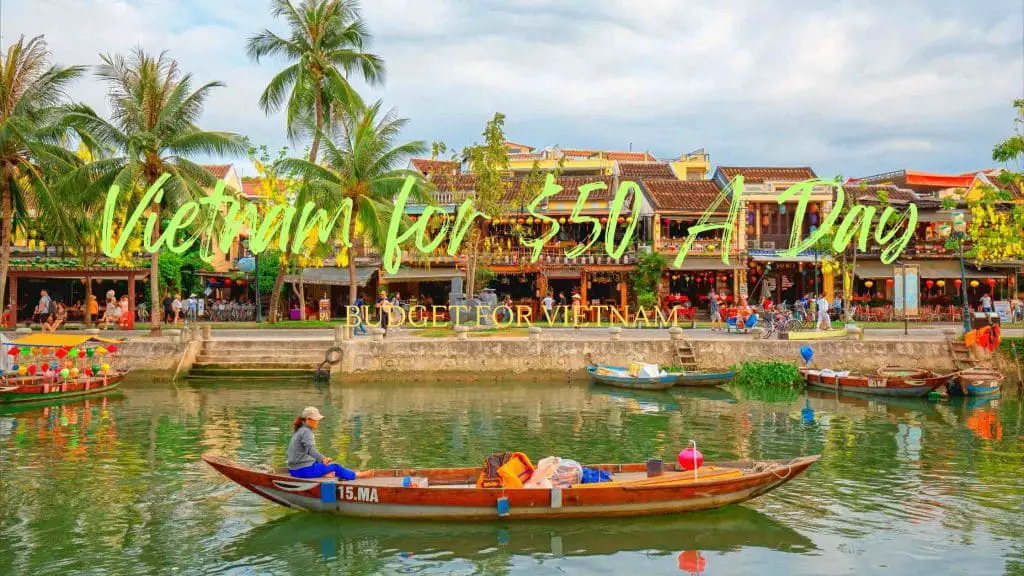
Budget For Vietnam Food and Dining
The food in Vietnam is diverse, delicious, and, importantly, affordable. From street food vendors to high-end restaurants, there’s something for every palate and budget. Western food is available, but trying local Vietnamese food is a must for a true cultural experience.
Restaurants in Vietnam offer a wide range of dining experiences. Whether you’re looking for a quick bite at a local eatery or a luxurious meal at a high-end restaurant, you’ll find that eating out can fit into any budget for Vietnam.
Street Food and Local Eateries
Street food in Vietnam is not only a budget-friendly option but also a way to dive into the local culture. Sampling dishes like pho or banh mi from a street vendor offers a taste of authentic Vietnamese food at a fraction of the restaurant prices.
This inexpensive option allows travelers to try a variety of dishes and flavors, making it an integral part of managing a budget for Vietnam. Street food stands and local eateries are found in every city, making it easy to enjoy delicious meals without breaking the bank.
Average Cost of Meals
The average cost of meals in Vietnam can vary depending on where you eat. Street food and local eateries offer dishes for just a few dollars, providing a filling and flavorful meal on a budget. In contrast, dining at restaurants can cost more but still remains affordable compared to Western standards.
For those on a tight budget for Vietnam, local markets are a treasure trove of fresh, inexpensive ingredients. Preparing your own meals can be a cost-effective way to stretch your budget further, especially for longer stays.
Remember, the region can also affect food prices. Tourist hotspots may have higher prices, while off-the-beaten-path locations offer cheaper alternatives. Keep this in mind when budgeting for meals during your trip to Vietnam.
Food Tours and Cooking Classes
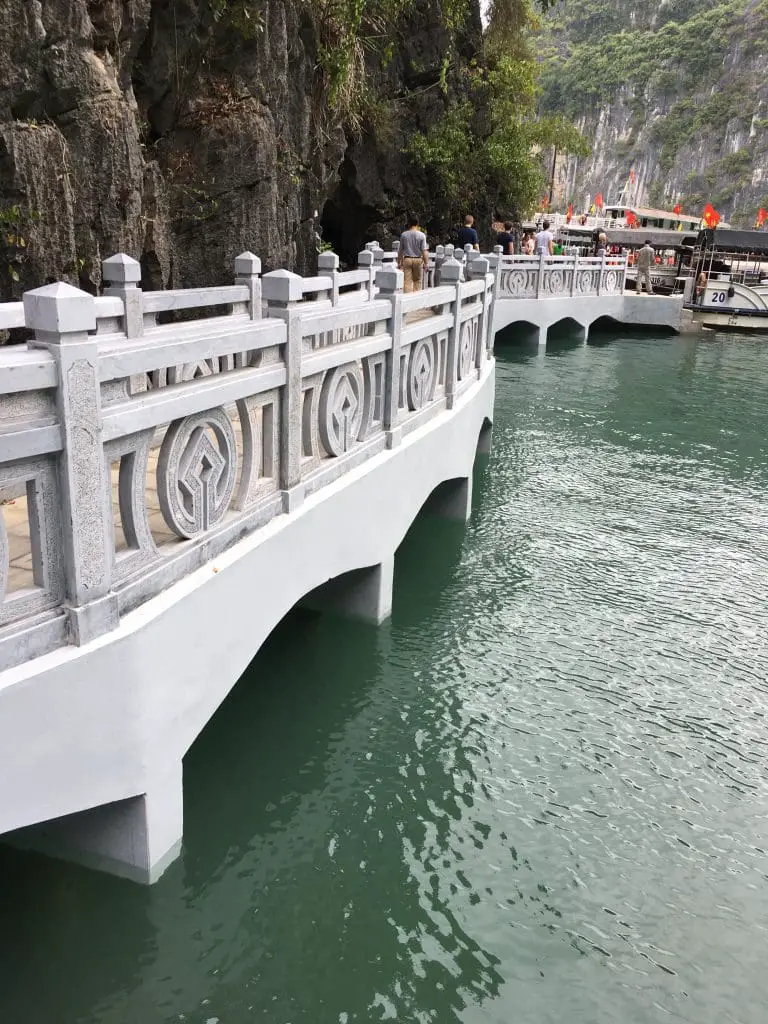
Joining a food tour or signing up for a cooking class are fantastic ways to immerse yourself in Vietnamese culture. Not only do you get to try a variety of dishes, but you also learn about the history and techniques behind them. Although these activities come at a cost, they provide value that goes beyond merely eating.
For example, a walking tour that includes tasting iconic dishes like egg coffee or bun cha offers insight into local culinary traditions. These experiences can be a highlight of your trip, making them worth the investment in your budget for Vietnam.
Cooking classes, meanwhile, equip you with the skills to recreate Vietnamese dishes at home, extending the value of your experience. While these activities add to your budget for Vietnam, they offer unique memories and skills that last a lifetime.
Western Restaurants and Fine Dining
When exploring the budget for Vietnam, dining in Western restaurants and indulging in fine dining experiences can be a delightful treat. These sit-down restaurants offer a variety of international cuisines, including French, Italian, and American. However, expect to pay more than at local eateries, especially when adding alcoholic beverages to your meal, which can significantly increase the bill.
Despite the higher costs, experiencing Western cuisine in Vietnam offers a unique blend of local and international flavors. Rice noodles, a staple in Vietnamese cuisine, may find their way into innovative dishes at these upscale establishments. Budgeting for a few meals at these restaurants can add a luxurious touch to your Vietnam travel experience without breaking the bank.
Activities and Sightseeing in Vietnam
Activities and sightseeing are pivotal when planning the budget for Vietnam. From the breathtaking Halong Bay cruise to the informative tour from Hanoi to Phong Nha, the country is filled with adventures that cater to every interest. The War Remnants Museum and the serene rice paddies also offer unique experiences, with sightseeing expenses varying widely depending on the location and type of activity.
While some tours, like those to Phong Nha, can be pricier, they offer unparalleled access to Vietnam’s natural beauty and historical sites. Balancing costlier excursions with free or low-cost activities, such as exploring rice paddies, can help maintain a balanced budget for Vietnam.
Entrance Fees and Activity Costs
The budget for Vietnam should account for entrance fees and activity costs, which can add up. A tour from Hanoi to the Cu Chi Tunnels, for instance, is an essential experience for history buffs but comes with its own set of costs. Similarly, Hoan Kiem Lake in Hanoi, while cheaper to visit, may have small fees for nearby attractions.
Planning ahead and setting aside a portion of your budget for these expenses ensures you won’t miss out on Vietnam’s must-see destinations. By researching entrance fees and budgeting accordingly, travelers can enjoy a rich experience without financial surprises.
Popular Tours and Excursions
One of the highlights in the budget for Vietnam is allocating funds for popular tours and excursions, such as a visit to the Mekong Delta. These experiences offer a deep dive into the local culture, cuisine, and landscapes. The Mekong Delta tour, in particular, showcases the vibrant life along the river, offering insights into the daily lives of the local community.
While these tours are an essential part of the Vietnam experience, choosing group tours over private ones can help reduce costs. Additionally, negotiating prices or booking in advance can also lead to savings, making room in the budget for other activities.
Travelers should consider the unique opportunities these tours offer, from boat rides on the delta to sampling local delicacies. Including these in the budget for Vietnam is crucial for a well-rounded trip.
Free and Low-Cost Attractions

Ninh Binh, known as the “Halong Bay on Land,” is a must-visit for those looking to stretch their budget for Vietnam. This area offers breathtaking landscapes and majestic limestone karsts that can be explored by boat or bike at minimal costs. The natural beauty of Ninh Binh provides a tranquil retreat from the bustling cities.
Exploring local markets, visiting pagodas, and taking in the scenic beauty of rural Vietnam are all cost-effective ways to enrich your travel experience. These activities not only keep the budget for Vietnam low but also offer a more intimate glimpse into Vietnamese culture and lifestyle.
For those on a tight budget for Vietnam, seeking out free walking tours in cities like Hanoi and Ho Chi Minh City can also provide insightful experiences led by locals, adding value to your trip without impacting your budget.
Adventure and Outdoor Activities
For the adventurous soul, allocating part of the budget for Vietnam to outdoor activities is a must. Embarking on a motorbike tour presents an exhilarating way to see the country, from its bustling cities to the serene countryside. These tours can vary in cost, but they offer an unmatched perspective of Vietnam’s diverse landscapes.
While motorbike tours require a larger upfront cost for rental and fuel, they allow for flexibility and the freedom to explore off-the-beaten-path locations. Budgeting for such adventures ensures a memorable and personal journey through Vietnam.
Trekking, Diving, and More
Vietnam’s natural landscapes offer endless opportunities for trekking, diving, and more, making it essential to include these activities in the budget for Vietnam. From the lush mountains of Sapa to the coral reefs of Phu Quoc, the country caters to every type of adventurer. Budgeting for equipment rental and guides can enhance these experiences, ensuring safety and access to hidden gems.
While diving in Phu Quoc might require a significant portion of the budget for equipment rental and professional guides, trekking can be a more budget-friendly option, with many trails accessible for free. However, hiring local guides for more challenging treks can offer insights into the area’s history and flora and fauna, enriching the experience.
Regardless of the activity chosen, investing in these experiences contributes to the overall richness of the Vietnam travel experience, making it a worthwhile addition to the budget for Vietnam.
Equipment Rental and Guides
When planning the budget for Vietnam, considering the cost of equipment rental and guides for outdoor activities is crucial. In destinations like Phu Quoc, where diving is a popular activity, renting equipment and hiring guides can account for a significant part of the budget. Similarly, for those looking to explore the country by rail or road, accounting for buses and trains is essential.
While these costs can add up, they are essential for accessing some of Vietnam’s most incredible landscapes and experiences. Renting bikes or scooters, for instance, offers the freedom to explore at your own pace, while guides can provide invaluable local knowledge and access to areas less traveled.
Allocating funds for these expenses ensures a safe and enriching adventure, making them a crucial part of the budget for Vietnam. With careful planning, travelers can enjoy the best of Vietnam’s outdoor offerings without overspending.
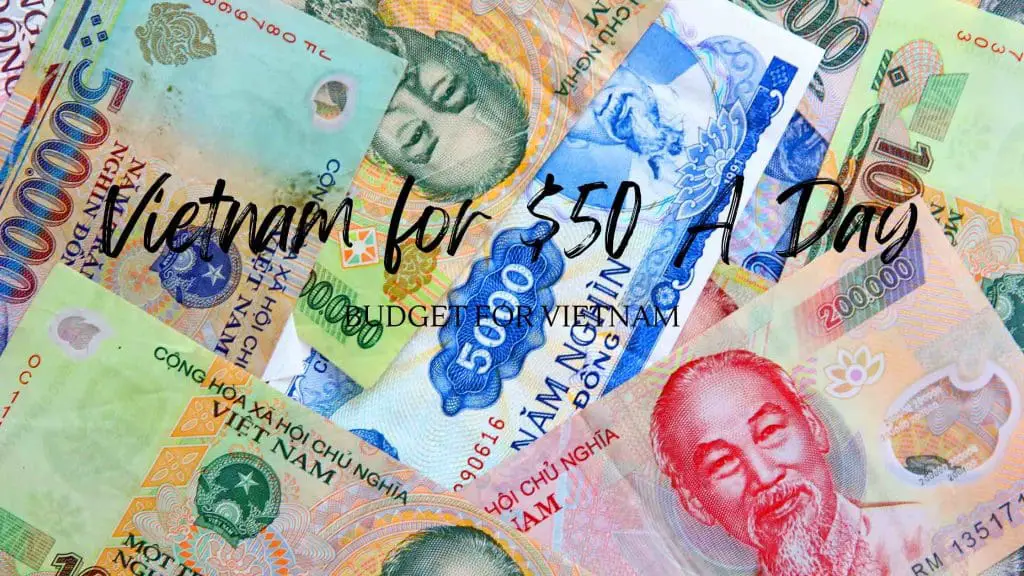
Budget for vietnam Tips and Tricks
Maximizing the budget for Vietnam requires savvy planning and a few tips and tricks. One of the most effective ways to stretch your dollars is by traveling during the off-season, which not only reduces costs but also crowds. Utilizing discounts and deals for accommodations and tours can also lead to significant savings.
Moreover, embracing local transportation methods and dining options can dramatically lower daily expenses, allowing for a more authentic experience. These strategies are key to enjoying a rich Vietnamese adventure without straining your budget.
Reducing Your Expenses
Reducing your expenses is crucial for stretching the budget for Vietnam. Investing in travel insurance can save money in the long run by protecting against unexpected costs due to illness or travel disruptions. Similarly, purchasing local SIM cards for data and communication can be much cheaper than international roaming charges.
Another tip is to prioritize experiences over souvenirs, focusing spending on memorable activities rather than material items. By carefully selecting where and how money is spent, travelers can significantly reduce their expenses, ensuring a fulfilling trip within the budget for Vietnam.
Travel During the Off-Season
Traveling during the off-season is a smart way to stretch your budget for Vietnam. Prices can vary greatly between the peak and off-peak seasons. During the off-season, you’ll find that accommodation costs drop and many tour operators offer discounts. This can make a big difference in your overall expenses.
Another advantage is that popular spots are less crowded. This means you can enjoy the beauty of Vietnam more peacefully. Plus, the cooler weather in some regions makes exploring more comfortable. Remember, the off-season varies by region, so do a little research to plan accordingly.
Lastly, engaging with locals becomes more personal. With fewer tourists around, you’re likely to have more meaningful interactions. This can lead to unexpected invitations and insights into Vietnamese culture. Always be open and respectful, and your budget trip to Vietnam will be enriched by these experiences.
Utilizing Discounts and Deals
Finding discounts and deals is crucial for a tight budget for Vietnam. Many travel websites and apps offer last-minute deals on tours and accommodations. Sign up for alerts to snatch up these offers. Sometimes, you can save up to 50% off the regular price.
Loyalty programs are another way to save. If you frequently use a certain booking platform, you might accumulate points that can be redeemed for discounts. Additionally, some credit cards offer travel rewards that can be applied towards flights or hotels, further reducing your expenses.
Don’t overlook local deals either. Restaurants and attractions sometimes have promotions that are only advertised onsite or through local tourism offices. Asking around or checking local websites can uncover these hidden gems, making your budget for Vietnam go even further.
Budgeting for Souvenirs and Shopping
When planning your budget for Vietnam, set aside money for souvenirs and shopping. Vietnam offers a range of unique items, from handmade textiles to local art. Knowing the average costs of these items can help you allocate your budget wisely.
Remember, prices can vary depending on where you shop. Markets in tourist areas tend to be higher priced than those frequented by locals. Plan to explore different shopping areas to find the best deals and ensure your souvenirs don’t break your budget for Vietnam.
Bargaining in Local Markets
Bargaining is a part of the shopping experience in Vietnam. It’s expected in local markets and can help you stick to your budget for Vietnam. Start by offering about half of the asking price and negotiate from there. Keep the interaction friendly and respectful, as this approach is more likely to result in a favorable outcome.
Be prepared to walk away if the price doesn’t meet your budget. Often, sellers will call you back with a better offer. This tactic can be surprisingly effective in getting the price you’re comfortable with, ensuring your budget for Vietnam remains intact.
Remember, the goal of bargaining is to reach a fair price for both parties. It’s not just about getting the lowest price possible but also about respecting the value of the goods and the work that went into making them. This respectful approach will enhance your shopping experience in Vietnam.
Souvenir Pricing Guide
Understanding the average costs of popular souvenirs can help you plan your budget for Vietnam. Handicrafts like silk scarves typically range from $5 to $20, depending on the quality and craftsmanship. Wooden carvings and ceramics might cost anywhere from $10 to $50.
For those interested in local food items, prices are quite reasonable. Packaged coffee and teas are usually priced between $3 and $15, making them affordable gifts or personal treats. Remember, prices can vary based on quality and where you purchase them.
Keep in mind that haggling is expected in markets but not in fixed-price shops. Consider this when shopping for souvenirs, as it can impact the final price. By familiarizing yourself with these average costs, you can make informed decisions that align with your budget for Vietnam.
Finalizing Your Vietnam Budget
As you wrap up planning your budget for Vietnam, review each category of expenses. Ensure you’ve accounted for everything from accommodations to food and drink. This comprehensive approach helps you avoid surprises and manage your finances effectively while traveling.
Consider setting aside a contingency fund for unexpected costs. This extra buffer can provide peace of mind, allowing you to enjoy your trip without worrying about finances. With your budget for Vietnam finalized, you’re ready to embark on an unforgettable journey.
Daily Budget Recap
A key component of your budget for Vietnam is estimating daily expenses. For food and drink, budgeting around $10 to $15 per day can cover local eateries and street food, providing a taste of authentic Vietnamese cuisine without a hefty price tag.
Remember, your travel style significantly influences your daily budget. Those seeking more comfort or luxury experiences should adjust their budget accordingly. Regardless of your preferences, Vietnam offers options for every traveler, ensuring an enriching experience for all.
Budget, Mid-range, and Luxury Estimates
For a budget traveler, plan to spend around $20 to $30 per day. This includes basic accommodations, local meals, and public transportation. Mid-range travelers might look at $50 to $100 per day, allowing for more comfortable hotels, diverse dining options, and some guided tours.
Luxury travelers can expect to spend over $150 per day, enjoying top-tier accommodations, gourmet restaurants, and private tours. These estimates help you understand the range of possibilities, ensuring your budget for Vietnam aligns with your travel style and preferences.
Unexpected Costs and Contingencies
While planning your budget for Vietnam, it’s wise to prepare for unexpected costs. These can range from last-minute transportation changes to health-related expenses. Allocating a portion of your budget for such contingencies ensures you’re prepared for any situation.
Another consideration is fluctuating exchange rates, which can impact your spending power. Monitoring these changes and having a flexible budget can mitigate potential issues. Additionally, always have a small reserve of cash for places that don’t accept cards.
Finally, investing in travel insurance can save you from significant unexpected expenses. It provides a safety net for health emergencies, trip cancellations, and lost belongings. This precaution is a valuable addition to your budget for Vietnam, offering peace of mind throughout your journey.
Budget for Vietnam: Conclusion
Reflecting on the True Cost of a Trip to Vietnam
Understanding the true cost of a trip to Vietnam is about more than just adding numbers. It’s about recognizing how your travel style influences your expenses. For some, Vietnam is incredibly affordable, offering meals for less than the cost of a coffee shop visit in other countries. Guided tours, domestic flights in Vietnam, and even a simple bus from Hoi An to Hue can significantly impact your budget for Vietnam, depending on how you choose to travel. Two weeks might seem like a short time, but with careful planning, it can be just right to explore without breaking the bank.
When considering alcohol in Vietnam, prices vary whether you’re sipping local rice wine or enjoying craft beer at a trendy bar. Similarly, opting for a bicycle rental can save money compared to a jeep tour, again showing how costs will vary with each travel style. Dining out for lunch or dinner in Vietnam is generally cheap, but adding alcohol can change the total cost of your meal. However, even with these variations, Vietnam remains one of the more budget-friendly countries in the world for travelers.
For those planning to stay longer, say 3 weeks, the budget for Vietnam stretches to accommodate more experiences. Yet, the principle remains the same: your choices, from accommodation to dining and activities, play the biggest role in your overall spending. Whether you’re seeking adventure or relaxation, the budget for Vietnam can be tailored to meet your needs, making it a versatile destination for all kinds of travelers.
Making the Most of Your Budget in Vietnam
Making the most of your budget for Vietnam hinges on understanding and adapting your travel style to local opportunities. For instance, indulging in street food rather than dining at western restaurants can offer not just a deeper cultural experience but also substantial savings. Similarly, choosing local transportation options over private tours can significantly reduce your expenses. The key is to prioritize experiences that are unique to Vietnam, which often also happen to be the most affordable.
Traveling during the off-season is another effective strategy to stretch your budget for Vietnam. Not only are accommodation and flight prices lower, but you’ll also encounter fewer tourists. This can lead to a more authentic experience of Vietnam’s stunning landscapes and rich culture. Additionally, taking the time to research discounts and deals, especially for activities like cooking classes or popular tours, can lead to significant savings without compromising the quality of your experience.
Finally, the essence of a well-managed budget for Vietnam lies in flexibility and openness to new experiences. Opting for a coffee in a local café over a hotel breakfast, or choosing a scooter rental for a day’s exploration, can add unique memories to your travel diary while keeping costs low. Remember, the beauty of Vietnam isn’t just in its landscapes or cities but in the adventure of discovering it in a way that aligns with both your dreams and your budget for Vietnam.

